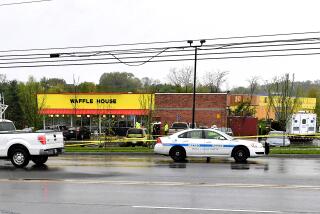An Epic-Length Diatribe Against Politics, Guns and Money
Like many another old-timer, Leon Uris looks at America and doesn’t like what he sees. Gun manufacturers peddling ever more lethal weaponry under the cover of the Second Amendment. Media grown hysterical and trivial. Racial sores left to fester. The nation’s “social agenda” abandoned in favor of corporate greed. A general falling-off of virtue, so that the heroic Marines of World War II he wrote about in his first novel, “Battle Cry,” are grotesquely parodied by right-wing militiamen. And, lurking under it all, anti-Semitism.
Uris probably should have written a letter to the editor or an essay for the op-ed pages. But he’s a novelist. Birds fly, fish swim. The author of “Exodus,” “QB VII” and “Redemption” saw no other way to express his concerns than to give us a full-dress, 500-page epic, culminating in a 2008 presidential race between Colorado Gov. Quinn Patrick O’Connell, “the last great liberal of the Rocky Mountains,” and GOP incumbent Thornton Tomtree, a billionaire computer genius who is programmed by his handlers to feign the human feelings he lacks.
O’Connell is fiery and warm, tough and compassionate, sexy and intellectual, principled and tolerant--except for this collection of adjectives, there’s really nothing to say about him. But he has a secret. He’s Jewish. It’s so deep a secret that O’Connell learns about it only seven days before the election. He was adopted by Dan O’Connell, a Marine Corps veteran and Brooklyn cop turned Colorado rancher and state senator, and his wife, Siobhan. They knew nothing of his origins--much less that his birth name was Alexander Horowitz.
Because he’s the kind of guy he is, O’Connell immediately shares this information with the public. And because Tomtree is the kind of guy he is, he spies a chance to revive his flagging campaign. The Jewish issue causes riots by everyone from the Klan to neo-Nazis to Farrakhan-type blacks. It’s another--Uris uses the very word--Kristallnacht.
Tomtree’s duty to his country is to quell the riots, but he calculates that the longer he lets them go on, the greater the pressure will be on O’Connell to withdraw. So he waits. His boyhood friend and chief spinmeister, Darnell Jefferson, is appalled. Once he taught Tomtree to play passable high school basketball. Later he made a nerd into a politician. But what if Tomtree, in the end, has no soul, only “big-time greed”?
The trouble is obvious. A political novel has to be relevant to the real world. Would Americans really riot if a presidential candidate turned out to be Jewish? Is repeal of the Second Amendment a MORAL IMPERATIVE (Uris’ capitals), or is the author mistaking chronic irritants to our society for a full-blown crisis? “A God in Ruins” demonizes O’Connell’s opponents as much as they demonize him. At his best, in “Exodus” and “Trinity,” Uris married his stories of two-fisted men and lusty women with a seriousness about history. Those books had some importance. But here, when he cuts loose from history and ventures into the future, he loses his balance.
The best parts of “A God in Ruins,” not surprisingly, are the flashbacks: O’Connell family history. But Uris has little patience for this anymore; he barely sketches it in on his way to set pieces that rely heavily on Tom Clancy-style techno-detail. Chutzpah indeed, that a novel decrying the “sterilization of society,” the substitution of “instant gratification” for “knowledge dug from deep places,” should itself be such a potboiler.
More to Read
Sign up for our Book Club newsletter
Get the latest news, events and more from the Los Angeles Times Book Club, and help us get L.A. reading and talking.
You may occasionally receive promotional content from the Los Angeles Times.









